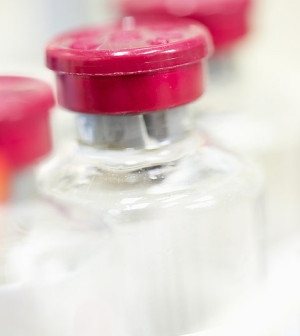- Could Your Grocery Store Meat Be Causing Recurring UTIs?
- Are You Making This Expensive Thermostat Error This Winter?
- Recognizing the Signs of Hypothyroidism
- 10 Strategies to Overcome Insomnia
- Could Artificial Sweeteners Be Aging the Brain Faster?
- Techniques for Soothing Your Nervous System
- Does the Water in Your House Smell Funny? Here’s Why
- Can a Daily Dose of Apple Cider Vinegar Actually Aid Weight Loss?
- 6 Health Beverages That Can Actually Spike Your Blood Sugar
- Treatment Options for Social Anxiety Disorder
2 Experimental Ebola Vaccines Show Potential

Two experimental Ebola vaccines showed promise in a clinical trial, researchers report.
The vaccines triggered an immune response and were well-tolerated among people in the phase 2 trial conducted in Liberia, one of the West African nations hit hard by the 2014 Ebola outbreak.
The trial was sponsored by the U.S. National Institute of Allergy and Infectious Diseases.
Researchers had planned to continue testing the vaccines in a broader phase 3 trial with 28,000 people, but that was abandoned because the decline in new Ebola cases made the larger study impossible.
The phase 2 trial tested the cAd3-EBOZ vaccine, which uses a chimpanzee-derived cold virus to deliver Ebola virus genetic material. The trial also tested the rVSV-ZEBOV vaccine, which uses the vesicular stomatitis virus — related to the rabies virus — to carry Ebola genetic material.
The trial included 1,500 people aged 18 and older with no reported history of Ebola disease, and was conducted in early 2015. Participants, divided into groups of 500 people, received either one of the two vaccines or a saline injection.
One month after getting the vaccines, measurable Ebola antibodies were detected in 87 percent of the people who received the cAd3-EBOZ vaccine and in 94 percent of the 500 people who received the rVSV-ZEBOV vaccine, the researchers said.
The findings were presented Tuesday by co-principal investigator Fatorma Bolay, director of the Liberian Institute for Biomedical Research, at the Conference on Retroviruses and Opportunistic Infections in Boston.
More information
The U.S. Centers for Disease Control and Prevention has more about Ebola.
Source: HealthDay
Copyright © 2026 HealthDay. All rights reserved.










